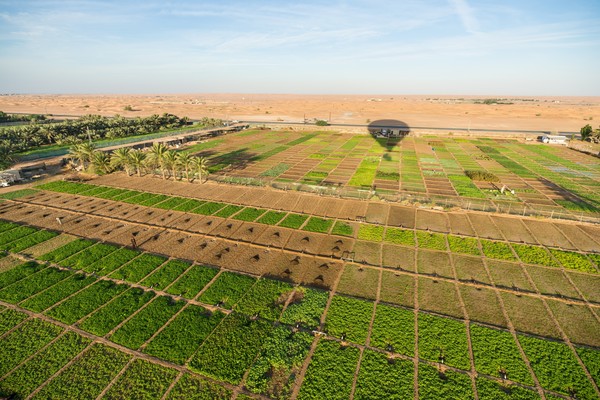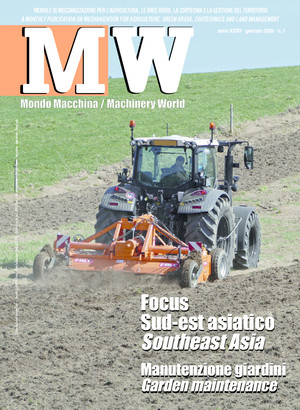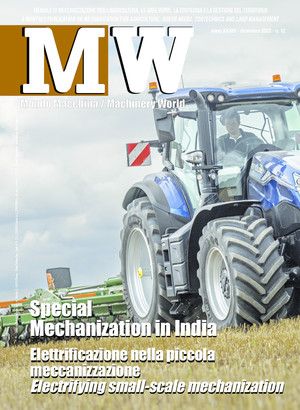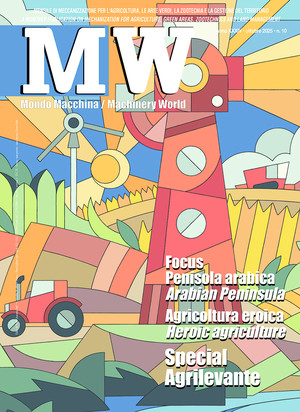
Business opportunities for Italian agribusiness
Water scarcity, arid soils, and desertification have not prevented the countries of the Arabian Peninsula from enhancing their agricultural economies, focusing in particular on high-value-added crops. The growth of gardening in Saudi Arabia and the United Arab Emirates
The opportunities in the agro-industrial sector offered by the countries in the Arabian Peninsula must obviously be considered in the context of territories characterized by water scarcity and desertification, which are key elements to bear in mind when intervening in agriculture. This does not mean that there have not been attempts to develop more "traditional" production in some of these markets.
For example, in the 1980s, Saudi Arabia launched an ambitious food self-sufficiency program and boosted wheat production to such an extent that in 1984 it became a net exporter and in 1992 one of the world's top 10 wheat exporters, reaching a production of 4.1 million tons. At that time, offers of wheat shipments also arrived on the desks of the major Italian trading companies. However, the rapid depletion of aquifers thwarted the Saudi plan, and in fact, since the early 2000s, the country has returned to being an importer of wheat and cereals. Those who had spoken of Saudi self-sufficiency in wheat were forced to acknowledge that Saudi Arabia had instead returned to "selling hydrocarbons to buy carbohydrates."
The United Arab Emirates has certainly achieved better results with its fruit and vegetable production: dates, mangoes, melons, and even blueberries, as well as vegetables such as lettuce, zucchini, peppers, and tomatoes. Cultivate UAE is a brand that is spreading throughout the Gulf countries and beyond. These results have been achieved thanks to technological input, such as hyper-technological greenhouses in the desert and the intelligent use of water resources, which have made it possible to grow crops even in the extreme conditions of a desert environment with high temperatures. In these sectors, opportunities for Italian companies are also combined with local companies that are extremely sensitive to technological innovation, driven by a class of young entrepreneurs who are certainly more inclined towards new best practices.
A second area in which our operators can find commercial opportunities and chances for cooperation with local companies is the gardening sector, which is linked both to the strong development of tourism (no longer only in Dubai, but also in the other Emirates, Saudi Arabia, Oman, and other countries in the region) but also to urban development Giga Projects, the most cited example of which is probably the Neom project in Saudi Arabia, but also those of Red Sea Global and Qiddiya.
Again in Saudi Arabia, and still linked to Vision 2030, there are two initiatives with a strong environmental component - the Saudi Green Initiative and the Riyadh Green Project - which involve substantial afforestation projects: the creation of extensive green areas on land not previously covered by vegetation. For this type of initiative, the entry route for our companies necessarily involves the ability to join the supply chains headed by a prime contractor, generally represented by large international companies capable of managing – including financially – projects of a very challenging size and duration.
To learn more about the characteristics and demand of these markets, trade fairs held in the Gulf area can be a useful resource. These events mostly have a broader focus on the agro-industry, including food and food processing, aquaculture, irrigation technologies, livestock farming, gardening, and more.
Below are some of the main events. AGRA Middle East and Global Vertical Farming Show (both in Dubai), Al Dhaid Agriculture Exhibition (Sharjah, UAE). The Saudi Agriculture Riyadh is the largest B2B event in the region in the agriculture, food, aquaculture, packaging, and related technologies sectors. Oman AgroFood and Kuwait International Agro Food Expo (KIAFE) are the leading events for Oman and Kuwait.
The main agricultural event in Bahrain is the Bahrain International Garden Show (BIGS), an annual fair focused on gardening, agriculture, and food security. Another interesting event is the Bahrain Exhibition for Animal and Agricultural Production (Mara'ee), while the main agricultural trade show in Qatar is AgriteQ (Qatar International Agricultural Exhibition), the latest edition of which (February 2025) was held at the Cultural Village Foundation, Katara.
Business opportunities and competitive advantages can also be seized by companies wishing to exploit the positioning of the Gulf markets as a regional hub. As mentioned above, a preferential channel for accessing these markets – particularly by exploiting their characteristic as a gateway to the entire Gulf and beyond – are the Free Trade Zones, Special Economic Zones, and similar entities that facilitate the direct presence of foreign operators on site. In this case, it is absolutely necessary to study the rules, which often differ from one another. Some – especially in the UAE – have a strong focus on companies that use the FTZ to enter third markets. In fact, therefore, activity in the FTZ is not aimed at sales in the UAE. Thus, these are solutions that may be of interest, for example, to companies that want to establish a logistics base, a warehouse, or a product display for customers who are not from the UAE but who have commercial relations and customs that involve traveling to the Emirates (e.g., South Asia and East Africa). On the other hand, in the case of Saudi Arabia, SEZs aim to attract foreign companies mainly for business development in the country, which does not exclude the possibility of selling in neighboring markets.








